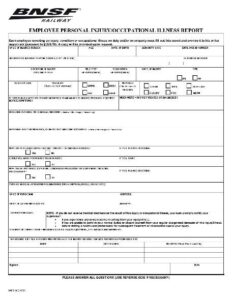
Nothing is more troubling than a railroad worker getting retaliated against simply because they were injured on the job. Most major railroads have made it a mission to create an atmosphere of fear and uncertainty about reporting on-the-job injuries. That is because under the Federal Employers’ Liability Act (FELA), railroad employers are responsible for compensating injured employees, often leading to millions in payouts. In some instances, employees have been punished simply for reporting injuries as the rules require them to. This often comes in the form of 
What many railroaders don’t know is that there is a law known as the Federal Railroad Safety Act (FRSA), which is designed to protect railroad workers in the event they are retaliated against simply for reporting an injury or safety concern. Over the years, railroad attorneys have been successful in holding employers accountable for this type of behavior, making them pay for their wrongdoing.
Your rights under the Federal Railroad Safety Act (FRSA)
The Federal Railroad Safety Act (FRSA) protects railroad employees who report injuries, safety concerns, or other protected activities. It’s meant to ensure workers can speak up without fear of losing their job.
Under the FRSA:
- You have the right to report a work-related injury or illness.
- Your employer cannot retaliate against you for making that report.
If they do, you may be entitled to reinstatement, back pay, compensatory damages, legal fees, and in some cases, punitive damages.
Retaliation can include any adverse action, such as being fired, demoted, denied overtime, reassigned, harassed, or discriminated against because you exercised your rights.
What to Do If You’re Fired After Reporting an Injury
If you suspect your termination was linked to reporting your injury, time is critical. Here are your next steps:
1. Document Everything
Start by collecting:
- Copies of your injury report and safety concern
- Termination notices or communications
- Emails, texts, or voicemails from your employer
- Notes detailing what happened, when, and who was involved
- Names of management and witnesses
- Details of similarly situated employees who were treated differently
This evidence will be crucial if you decide to take legal action.
2. Talk to an Attorney
FRSA cases can be complex, and railroads often have legal teams ready to defend their actions. Having a lawyer experienced in railroad cases can significantly improve your chances of success.
At Doran & Murphy, we offer free consultations and work on contingency—meaning we only get paid if we win your case. We often provide FRSA guidance in conjunction with a FELA injury case.
3. File a Complaint with OSHA
The Occupational Safety and Health Administration (OSHA) investigates whistleblower retaliation complaints, including those under the FRSA.
- Deadline: You must file your complaint within 180 days of the retaliatory action.
- You can file online, by mail, or in-person at an OSHA office.
You’re Not Alone
Retaliation for reporting injuries is a disturbingly common problem in the railroad industry, but you don’t have to face it alone. Workers have rights, and there are legal protections in place to help ensure you’re not punished for doing the right thing.
If you’ve been fired or retaliated against after reporting a workplace injury, don’t stay silent. Speak up, seek legal advice, and get the justice you deserve.





